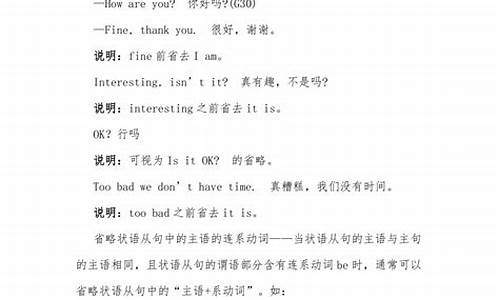您现在的位置是: 首页 > 经典语录 经典语录
英语省略句型_英语句子中的省略情况
tamoadmin 2024-08-19 人已围观
简介1.英语语法:英语句子结构中的省略或缩略2.在英语中省略的用法3.初中英语语法:初中英语语法 英语中的省略4.关于省略的几点特殊用法 - 六级语法5.英语 从句什么情况下可以省略关系词?6.英语中什么从句的连词可以省略,什么从句不可以省略?可以的,一般先行词在从句中作宾语时可以省略。这句先行词是the studies,从句还原:she was forced to give up (the stud
1.英语语法:英语句子结构中的省略或缩略
2.在英语中省略的用法
3.初中英语语法:初中英语语法 英语中的省略
4.关于省略的几点特殊用法 - 六级语法
5.英语 从句什么情况下可以省略关系词?
6.英语中什么从句的连词可以省略,什么从句不可以省略?

可以的,一般先行词在从句中作宾语时可以省略。这句先行词是the studies,从句还原:she was forced to give up (the studies) earlier in life, 即作give up的宾语,所以可以省略。
英语语法:英语句子结构中的省略或缩略
that 引导的是定语从句,且在从句中充当主语!所以不能省略,省略了从句就不完整啦!
另外省略常常用于以下情况:
1、关系代词which,whom,who,that在定语从句中作宾语时可以省略。
Here is the man (who/that/whom)you're been looking for.
2、当that在从句中作补语时可以省略。
He is not the man (that) he used to be.
3、当先行词是reason,而且定语从句中作原因状语时,关系代词可用why,that,也可以省略。
The reason (why/that) he failed was his laziness.
That is the reason (why) I did it.
5、当先行词是way,且在定语从句中作方式状语时,关系代词可用in which,that,也可以省略。
The way (in which/that) these comrades look at problems is wrong
在英语中省略的用法
1. 省略或缩略概述
在英语学习的过程中,有一点非常值得注意:在语言的发展过程中,表达方法具有简洁(brevity)和简明(conciseness)的发展倾向。通常,在缩略句(abbreviated sentences)中,几乎不存在因省略而使所要表达的思想变得模糊不清,因为这个省略是逐渐产生的,以至于读者或者听者很少会感觉到省略的部分。
正如Kellner所说, 省略 (ellipsis,希腊语“?λλειψη”,含义为“a leing out”(“遗漏”))? 是对言语迟缓的一种补偿。 从心理学上来说,省略句子成分有两种原因:(1) 通常,言语的动作太慢,跟不上思想产生的速度,因此,我们省略掉对句子含义没有实质影响的单词或者短语;(2) 有时候,省略是渴望获得关注。简洁就可以达到这个目的。而冗长的表达往往会让听者或读者对话题失去兴趣。而简洁不仅是“智慧之魂(soul of wit)”,更是维系注意力和兴趣的关键所在。
对于句法结构的学习者而言,获得必要句子成分的省略认知是很有必要的。 英语中很多困难的习语是通过语言单位的省略而产生的,成功解释它们的唯一方式,就是补上句法链中缺失的链接 。 在尝试分析一个句子之前,读者应该忠实地补上对于阐明(elucidate)句子元素之间关系可能是必要的这些词汇 。
2. 句子结构省略的益处
句子结构省略可以带来下列两种益处之一,有时候,第二种包含第一种:
第一,避免重复 。这种益处可见于对比状语从句,在这种句子中,主语和谓语都略去;以及见于其它情况下的避免重复的情况。例如:
(1) He is not so large as I (am large).
他没有我大。
(2) I like him better than (I like) you.
比你喜欢你,我更喜欢他。
(3) The girl is as pretty as her mother (is pretty).
这个女孩和她妈妈一样漂亮。
第二,实现简洁 。这是目前更高频率的省略类型。例如:
(1) He said (that) he would come early.
他说他会早点来。
(2) Though (he was) sick, he worked all day.
尽管他生病了,他仍然整天工作。
(3) (You) lee this instant!
你离开这一刻!
3. 省略类型
3.1 从句中的词汇省略
在从句中,由于相同的词汇既出现在主句中,也出现在从句中,因此,从句中的相应词汇常常省略。因此,这种省略是为了避免重复。有时候,我们也很容易将省略的词汇补上。在实用中,所有的从句都以某种形式表明它的省略。
3.1.1 时间从句中的省略
通常省略时间从句的主语和谓语 。例如:
(1) When (he is) eating, he never talks.
他从不在吃饭时讲话。
(2) I saw while (I was) sitting by the window,that the bird was building a nest.
当我(我)坐在窗边时,我看到那只鸟正在筑巢。
3.1.2 比较从句中的省略
有时候,为了避免重复,通常省略比较从句中的主语和谓语 。例如:
(1) He came as soon as he could (come).
他尽快来了。
(2) The child is larger than his brother (is large).
这个小孩比他哥哥个头更大。
(3) I admire him more than (I admire) his wife.
相比于他的妻子,我更钦佩他。
(4) He is larger than (he was large) when I saw him last.
他比我上次见到时大了。
3.1.3?方式从句中的省略
有时候,当“ as if ”、“ as through ”出现在从句中充当连接词的时候,省略整个方式从句 。例如:
(1) He looked as (he would look) if he were sick.
他看起来似乎生病了。(注:句子使用了虚拟语气,使用“were”)
(2) They love him as (they would love) a brother.
他们像爱兄弟一样爱他。
(3) They prepared to make their living as clerks (make their living) rather than (they prepared to make their living) as home keepers (make their living).
他们准备以职员的身份谋生,而不是以家庭主妇的身份谋生。
在以上最后两个句子中,我们看到了所谓的前置词“as”的起源,有时候又称为 引导小品词 (an introductory particle)。
3.1.4 让步从句中的省略
让步从句的让略,指的是省略连词或者内部单元。例如:
(1) (Though we are as) Fond as we are of him, we don’t want to see him too often.
虽然我们一样喜欢他,但是我们也不想经常见到他。(be fond of:喜欢)
(2) Be it ever (=Although it be ever) so humble, there’s no place like home.
尽管如此卑微,但没有比家更好的地方了。
(3) Through (he was) tired, he was an earnest worker.
尽管还是很累,但是他仍然是一个认真的工作。
(4) Whatever hens (= Though the thing which may hen hens), we will continue the fair.
不管发生什么事,我们将继续交易会。
(5) Come what may (=Though the thing which may come come), I will continue to act as before.
不管发生什么,我将一如既往。
3.1.5 条件从句中的省略
在条件句中,常常是条件句中的词序倒装导致了连词的省略。例如:
(1) Had I (=If I had) know your situation, I would he acted differently.
如果我知道你的处境,我会取不同的行动。
(2) Were he (If he were) here, I should apologize.
如他在这儿,我会道歉。
3.1.6 形容词从句(指修饰名词的定语从句)中的省略
所谓的关系代词as可能是唯一的一个引导比较状语从句的一个从属连词。在这种实例中的关系代词省略。 当关系代词是宾格时,也将其省略 。例如:
(1) He is the man (whom) I saw yesterday. (定语从句,关系代词whom为宾格)
这个男子正是我昨天看见的这个男子。
3.2 感叹句中的词汇省略
一个说话者或者写作者的情感常常导致他抛弃普通的散文风格而省略掉所有不必要的词汇。在修饰措词中,这种称为“ 破格文体 (anacoluthon)”,当句子以不同于开头的结构结束时一种,它就“脱离(breaking away)”常规的方式。在很多情况下,感叹表达式中的感叹词就是一种缩略形式。例如:
(1) O,(I wish) for a hen of rest!
哦,我希望有一个休息的天堂。
(2) The courage of a Paul—Oh, What would I give to possess that! If I only could see her tonight (, I should be hy) !
Paul的勇气——哦,我要付出什么才能拥有它!如果我今晚能见到她,我会很高兴的!
3.3 其它类型的词汇省略
3.3.1 复合句中的省略
复合句中句子成分的省略,经常将此类句子简化为看似带有复合主语或谓语的简单句子。例如:
(1) They live near the river, but (they) never fish.
他们住在河边,但是他们从不钓鱼。
(2) The child loved his mother, but (he did) not (love) his father.
这个小孩喜欢他妈妈,但是他不爱他爸爸。
(3) Either this boy (did it) or his brother did it.
要么是这个小男孩干的,要么是他爸爸干的。
3.3.2 主句的省略
有时候,当从句表达一种愿望或惊奇的时候,一个句子的主句整体省略。例如:
(1) If he had only acted that way (, I should be hy)!
如果他那样的话,我会很高兴的。
(2) O, (I wish) that he had remembered my admonition!
哦,但愿他记住了我的忠告。
3.3.3 口语中前置词的省略
在现代英语用法中,主要是在口语中,前置词常常省略。优秀的作者强烈抨击这种用法。
(1) Money gotten (in) that way will never do him any good.
那样挣的钱对他没有任何好处。
(2) He may stay (in) any place he chooses.
他可以住在他选择的任何地方。
(3) It hened (on) the last day of the week.
这事发生在一周的最后一天。
3.3.4 绝对词的省略
许多绝对词,如题词中的主格绝对词和独立不定式以及小品词,如果提供了缺失的词,则充当正常的语法职责。例如:
(1) To be belief (=I am going to be belief),I acted unwisely.
我要相信,我的行为不明智。
(2) Taking about children (= Since we are talking about children), Mrs. Elliott’s little girl is beautiful.
说到的孩子,艾略特太太的小女儿很漂亮。
(3) (This is)Harman’s English grammar.
这是Harman的英语语法。
3.3.5 日常用语中的省略
(1) Good day=I bid you a Good day
祝你愉快。
(2) Goodbye=God be with ye
愿上帝与你们同在。
(3) Good luck (be) to you.
祝你好运。
<<A New English Grammar>> M. A. LEIPER
初中英语语法:初中英语语法 英语中的省略
省略句(elliptical sentences)
定义:省略句是英语的一种习惯用法。按照语法的分析,句子应该具备的成分,有时出于修辞上的需要,为了避免重复、突出新信息使上下文紧密连接的修辞手段。
省略的部分:单词、短语、分句,都可以省略,而且各有一定的衔接关系,不容臆断
一、哪些部分可以省略
(一)省略单词 1、省略介词
He spent four hours (in) going over his lessons. 他花了四个小时复习功课。 I ' ve studied Eng1ish (for) five years. 我已学五年英语了。 2、省略连词
I believe (that) you will succeed . 我相信你们会成功的。 It ' s a pity (that) he ' s leing. 他要走,真遗憾。 I ' m sure (that) she will help you. 我肯定她会帮你的。 3、省略关系代词
I ' ll give you all (that) I he. 我要把我所有的一切都给你。 He read the book (which) I got yesterday. 他看过我昨天买的书了。 二、省略句子成分
1、省略主语
Beg your pardon. (我)请你原谅。( Beg 前省略了主语 I ) Take care! 当心!( Take 前省略了主语 you ) Looks as if it will rain. 看起来象要下雨。( Looks 前省略了主语 it ) 2、省略谓语
Who next? 该谁了?( Who 后面省略了谓语 comes )
The river was deep and the ice thin. ( ice 后面省略了 was ) We ' ll do the best we can. 我们将尽力而为。( can 后面省略了动词 do )
3、省略表语
Are you ready? Yes, I am. 你准备好了吗? 我准备好了。( am 后面省略了 ready ) He was a lover of sports as he had been in his youth. 他还是象年轻时那样,是一位运动爱好者。( had been 后面省略了 a lover of sports ) 4、省略宾语
Let ' s do the dishes. I ' ll wash and you ' ll dry. 让我们洗碗吧,我来洗,你来揩干。( wash 和 dry 后面省略了宾语 dishes )
5、省略定语
He spent part of the money, and the rest he sed. 那钱他花了部分,其余的他都存了起来。( the rest 后面省略了定语 of the money )
6、省略状语
He was not hurt. Strange! 他没有受伤,真奇怪!( Strange 前面省略了状语 how )
二、什么句式中可以省略
1. 简单句中的省略: 在对话中,交谈双方都知道谈论的对象,则可以省略句子的主语,省略主语和谓语的现象在交际用语中出现的很多。 如省略it 和 主语 I (1)Looks like rain. (it)
(2)Hope to hear from you soon. (I)
(3)Sounds like a good idea.
2. 并列句中的省略:在并列句中,相同的成分如主语,谓语,宾语等都可以省略: (1)They learn French and we English.
(2)My father planned and built all these houses. (3)John won the first race and Jimmy the second.
3. 复合句中的省略: 定语从句:(1)That’s the reason he is late for the conference.
状语从句:(1)If heated, water will boil. (2)Tom was attacked by cramp while swimming across the river. 宾语从句:如果宾语从句中的谓语部分与主句的谓语部分或上文的谓语部分相同,可将从句部分的谓语省略。
(1)We will do what we can(do)to help you.
(2)—Is Mr. King in his office? —Sorry, I don’t know(whether he is in his office or not).
4. 动词不定式的省略:在动词不定式结构中,为避免重复,常常省略不定式结构中的动词原形,只保留to。 (1)—Would you like to go with us ? —I’m glad to*, but I he to finish my homework.
在used to, ought to, he to, would like/love to, wish to, be going to等结构中,常常省略to后面的动词原形。 (1)They do not visit their parents as much as they ought to* (2)He doesn’t get up early as he used to*. (3)I’ll hand it in if I he to*.(4)—Would you like to come tonight ? —I’d love to.
Tell , warn , order , advise , ask等动词的宾语后接动词不定式做宾语补足语时,可以省略to后的动词原形。 (1)He wanted to swim across the river but I warned him not to.(2)The boy wanted to play football in the street, but his mother told him not to.
三、特殊用法 一、原文“空缺”,译文“增补”
两个主语不同的句子,谓语有相同部分,也有不同部分,如果用连词连接起来进行对比,则其相同部分在后面分句中可以省略,这样,后面分句中就出现“空缺”现象。“空缺”处通常被省略的是动词,或动词及其宾语、补足语等。汉译时不妨用“补齐”的方法。
例如:A sound must be heard,a colour seen,a flour tasted,an odour inhaled.,颜色必须目视,滋味必须口尝,气味必须鼻吸。(后三句省略 must be) Histories make men wise;mathematic logic and rhetoric able to contend.;数学使人精细;逻辑和修辞使人善辩。(原文后两句省略make men) 二、英语状语从句中的省略部分可不译
than引出的比较从句中,套有when引导的时间从句或if引导的条件从句,而且该比较从句中的省略部分与整个句子的主要结构一致时则比较从句的省略部分可省略不译。例如:
My uncle is better than when I wrote to我伯父的身体比我上次给你去信时好些了(...than后面省略了he was) 三、对英语中一些特殊省略结构译法需灵活,指的是按正常语法规则分析,有的无法增补,有的要用不同的方式来增补,使之成为完全句。因此,汉译英时,视上下文加以灵活处理。
1.“宾语+主语+谓语?and +谓语”结构
其中and连接的,是用作不同成分的同一个词,这个词既是第一分句的宾语,又是第二分句的主语。此结构的特点是,把宾语提到句首,使之兼任后一分句的主语,达到简化句子结构的目的。汉译时,可仍先译宾语,不必改变原文的语序。例如:
This substance we call water,and come next only to oxygen.这种物质称为水,其重要性仅次于氧。(=We call this substance water,and this substance comes next only to oxygen.) 2.以“Hence +名词”开头的结构
hence是表示结果意义的连接副词,hence前面的句子表示原因,hence后面则省略了类似 come的动词。它是倒装句。例如:
Hence(comes)this instruction of the experiment因此,有这本实验说明书。 3.某些常用词组引导的省略疑问句,通常不需要写出其省略部分。例如: How(is it)about the result?结果怎么样呢?
4.由习语组成的省略结构 So much is for the foundry processes.工艺过程的内容就是这些。(=Enough has been said or done about...;That is all we'll say about...) Now for the sound-we method.现在谈谈风波方法。(=And we will now talk about...) The grinding machine you operate must be oiled,and that at once.油,而且要马上上油。(and that是个加强语气的省略结构。that是指示代词,代替上文的全部,与and连用表示强调,后接状语。=andmustbeoiledat可译为“而且”。)
四、介词(短语)的“无胜于有”
英语介词(短语)应用之频繁,简直到了“不可稍离”的地步。它是功能词中最积极、最活跃之一。但有时,为了用词简洁精练,在上下文意境清楚的前提下,介词常常省略。译文中也要取相应的简洁表达手法。
1. 动名词-ing前,有时省略介词。
Most people just ruin scissors by)trying to sharpen them.大多数人想把剪刀磨快,结果却磨坏了。 2. 在含有way,height,length,size,shape, ckness等惯用语前,有时省略介词。 Try to keep your letters on)this side of 500 words.写信请勿超过五百字。
3. 在以next,this,one,every,each,some,等开头的时间状语前,有时省略介词。 Nine days(from)now will be May Day.起再过九天,便是五一节。
4. 在“noun +participle”,“noun +and all”结构中,有时省略介词“with”。 He jumped into the water, (with his)clothes and all.他和着衣服跳进水里。 5. 某些动词、名词、形容词习惯搭配中的介词(短语),在以what,when,how,whether,that出的从句
或不定式短语之前,有时被省略。例如: I am not informed(as to)whether he went,why from.我没听说他是否去了,为什么去,什么时候去,来自何地方。(省略与informed搭配的介词as to。) They are tempered to be careless (of)how they spend their time,because they imagine they he so much of it.对于如何支配时间,他们总是漫不经心,因为他们认为时间多的是。(省略与形容词careless搭配的介词of。)
关于省略的几点特殊用法 - 六级语法
《初中英语语法 英语中的省略》由英语我整理,更多请访问:s://.liuxue86/english/。本内容整理时间为05月12日,如有任何问题请联系我们。
在英语中,为了避免重复,句子中的某些部分经常省略,给考生的理解增加了困难。在近几年的NMET中,省略现象十分常见,为帮助考生更好地迎战高考,现对省略现象总结如下:
一、并列复合句中某些相同成分的省略。
1. This beeper works well,but that one doesnt (work well).
这个寻呼机工作正常,但那个就不行。
2. All uranium atoms do not he the same atomic weight. Some of them weigh 234 units,some (of them) (weigh) 235 units,and some (of them) (weigh) 238 units.所有的铀原子并非都有相同的原子量。其中有的重234,有的重235,而有的重238。
二、在when,while,if,as if,though(或although),as,until,once,wheth er,unless,where等连词连接的状语从句中,常省略跟主句相同的主语和be动词。
1. When (water is) pure,water is a colorless liquid.
水纯净时,是无色的液体。
2. When (I am) in trouble I always turn to her for help.
我困难时总是找她帮助。
3. Errors,if any,should be corrected.
如果有什么错误,就应当改正。(if后省略了there are)
4. Wood gives much smoke while (wood is) burning.
木头燃烧时,它放出很多烟。
5. The letter is to be left here until (it is) called for.
这封信留在这里待领。
6. Henry looked about as if (he were) in search of something.
亨利向四周环视,似乎在寻找什么。
7. She studies very hard though (she is) still rather weak.
她尽管体弱,但学习仍十分努力。
三、当见到?when (或if,where,wherever,whenever,as soon as,as fast a s,than等)+possible/necessary等?时,可理解中间省略了it is(或was)。
1. Answer these questions,if (it is) possible without referring to the book.
如果有可能,请不看书回答这些问题。
2. When (it is) necessary you can help us to do something.
必要时你可以帮助我们做些事。
四、有形式主语it的主语从句可省略that。
1. It seems (或ears) (that) Joe is out,not Jack.
外出不在的似乎是乔,不是杰克。
2. It is an honor (that) I was invited to your birthday party.
我很荣幸被邀请参加你的生日聚会。
3. Its a pity (that) you cant operate a computer.
很遗憾,你不会操作计算机。
4. It is the third time (that) I he come to China.
这是我第三次来中国。
五、在限制性定语从句中可省略作宾语的关系代词whom,which,that。
1. That is the naughty boy (whom/that) we talked about last week.
那就是我们上周议论的淘气男孩。
六、在direction(方向),way(方式),distance(距离),time(时间),times(倍数)等后面所接的定语从句中常省略that,which,in which。
1. The direction (in which) we move a body can be changed.
我们移动物体的方向是可以改变的。
2. The distance (which或that) light trels in one second is 300,000 kilometers.
光每秒走的距离是30万公里。
七、以there be开头的句子,其主语的定语从句常可省略关联词,而there be结构作定语从句时,省略作主语的关系代词。
1. There is a chance Dr. Li will be able to be back for May Day.
李博士也许有机会能回来过五一节。
2. We he to make a list of all the books there are on the subject. 我们必须把所有关于这个题目的书列出一个单子。
八、命令句、惊叹句、部分第一人称的陈述句、部分问句和答句中省略最为常见。
1. Open the door!开门!
2. Why not?为什么不?
3. Why so?为什么这样?
4. Anybody wishing to go?谁愿意去啊?
九、用so,not或其它手段来省略上文或问句中的一部分或整个句义,是NMET的常考项目。
1.?Can Emily do this work?
埃米莉能做这件工作吗?
?I think so.
我想她行。
?I think not (或I dont think so).
我想她不行。
2.?Did you know anything about it?
这件事你以前知道吗?
?Not until you told me.
你告诉了我,才知道。
3. He has gone. No one knowsswheres(he has gone).
他走了,谁也不知道他去什么地方了。
4. Jenny knows what (is to be done)!
詹妮有办法! 《初中英语语法 英语中的省略》由英语我整理,更多请访问:s://.liuxue86/english/
英语 从句什么情况下可以省略关系词?
为了避免重复,英语中的许多句子经常省略一个或几个成分,这种语法现象称为省略。简单句中的省略相对来说容易把握,而复合句中的省略就比较难以识别和运用。关键的是,应首先了解在何种情况下句子的某一成分才可以省略本文着重讲述复合句中的省略。一般来说,英语学习者都比较熟悉两种有关复合句的省略:(1)从属连词that在其引导的宾语从句中常省略。(2)限定性定语从句中作宾语的关系代词that,which或whom常省略。但也有一些比较复杂但又常用的省略现象并不为许,对此一定要加强认识并正确运用。?1.以从属连词when,while,as,though,if,un-,whether...or等引导的状语从句中,如果谓语动词包含有动词be,且主、从句中的主语一致,或从句的主语为it,则常可省略从句的主语和谓语的一部分。
?
?If(it is)possible,I shall fly to Beijing tomorrow on business.
?Whenever(it is)necessary,he will come to help me.
?A tiger can not be tamed unless (it was)caught very young.
?2.以从属连词as,than引导的比较状语从句中,常省略一部分成分。
?He was asked to fill in the form as (it was)required.要求他按照要求填写这份表格。
?Please finish this project as soon as (it is)possible.
?He always gives more thought to others(he gives thought)to himself.他关心别人比关心自己要多。
?She ge me the impression of hing more teeth than(they)were necessary for any?practicalpur她给我的印象是,她长的牙齿数目太多,超过了实际需要。
?3?不定式符号后常省略上文提及的不定式短语)。
?She asked him to pay the rent immediately,but he refused to(pay).
?At first he didn't want to apologize,but I persuaded him to (apologize).刚开始时他不想道歉,但我劝说他这样做了。
?I saw him kicking a football on the street, and I told him not to(kick).
?4.并列复合句中省略主语或谓语,或同时省略主语和谓语。
?In autumn,the day is getting shorter and shorter, and the night(is getting)longer
?and longer.秋天,白昼越来越短,而夜晚越来越长。
?They tried to swim cross the channel but(they tried)in vain.
?注意:有时,so可以用来代替一个从句或从句的一部分,这一语法现象称为替代,不属于省略。这种现象常常用在有上下文联系的对话或文。
?-Will he come to attend the meeting?
?Ithink so.
?He hopes to he a scholarship,and I hope so, too.
?She became a loyal friend and remained so. 她成了一个忠诚的朋友,而且一直如此。
?5.there be结构作定语时,省略作主语的关系代词。
?They are asked to make a list of the reference books there are on the subject of? international trade.要求他们列出有关国际贸易这一题目的参考书。
?6.在the +比较级……,the +比较级的句型中,常省略动词be,有时,还可省略除the和比较级形式以外的所有其它成分。
?The older you are,the poorer your memory(will be).年龄越大,记忆力越差。
?The more(money I can earn),the better(it will be).多多益善。
?7.当定语从句的先行词为way,direction, distance时,常省略关系代词。
?The direction(that)you are going in is north.
?Practice is the basic way(that)we learn a foreign language well.最根本途径。
?8.虚拟语气中也有两种需要省略的情况。一种是省略连词if;一种是省略should。但是,必须注意:在虚拟语气中省略should时,句子的顺序不变,而在省略if时,句子则需要倒装。试比较下列句子:
?It was suggested that the meeting should)be postponed.有人建议将会议推迟。
Had Thomas Edison,the great inventor his money,he would he died a wealth man.如果托马斯·爱迪生这位明家当年把钱都存起来的话,他去世时,肯定是个大富翁。
(=If Thomas Edison had stored his money,...)
英语中什么从句的连词可以省略,什么从句不可以省略?
一、定语从句中关系代词的省略:
在限定性定语从句中,关系代词在从句中充当宾语时,则可省略该关系代词.
Do you remember the school (which/that) we visited last year?
Do you remember the teacher (who/whom/that) we visited last year?
二、名词性从句中的省略:
名词性从句中,只可以省略宾语从句中的第一个that,主语从句、表语从句和同位语从句中的that均不可省略.
He said (that) he liked the book and that it was interesting.(宾语从句)
The reason why he liked the book was that it was interesting.(表语从句)
That the book was interesting was the reason why he liked it.(主语从句),5,定语从句中关系词省略的6种情形:
关系词有时可以省略,但这只限于限制性定语从句中,在非限制性定语从句中,关系词则不可省略。
一、关系代词作宾语时的省略。当关系代词who, whom, which和that在定语从句中用作动词宾语或介词位于句末时的介词宾语时,可以省略。如:在定语从句中用作动词宾语或介词位于句末时的介词宾语时,可以省略。如:Is there ...,2,如果按照正规高中语法,那么我赞同楼上,因为上了大学之后就会发现有些不同,而且口语要求没那么严格。
另外,他说的只是定语从句中,我补充一下其它从句:
1.宾语从句:一般that作关系词时that都可以省略,但当一个句子中同时有两个或两个以上的宾语从句且从句间用连词连接时,只可以省略第一个关系词that;但是关系副词不可省略。
如:I tell her (that) I am ...,0,
在英语中that和which可以省略的从句是定语从句,省略的条件是现行词在从句中作宾语才可以省略,其他情况则不可以省略。
例如1:I can't find the book (which/that) I bought last month. 现行词the book在从句中作bought的宾语,可以省略。
例2:The book which / that was bought last month was lost yeaterday. 这题现行词the book在从句中作主语,此处不能省略。
还有一种that可以省略的的从句,就是宾语从句。
例如:Our teacher suggests (that) we should read English every day. 这里suggests后面的是宾语从句,that可以省略。
注意:如果一个动词后面接两个或者两个以上的宾语从句时,第一个从句的that可以省略,但从第二个从句开始that不能省略。
例如:The teacher said (that) we should read English every day and that there would be an English exam next week.这里said连接两个宾语从句,第一个从句的that可省可不省略,第二个不可以省略。









